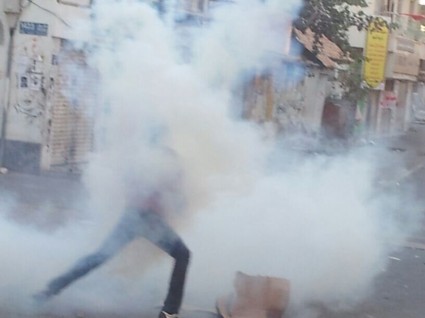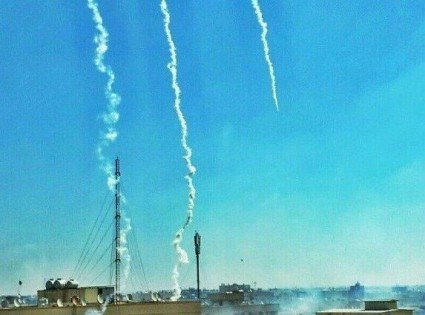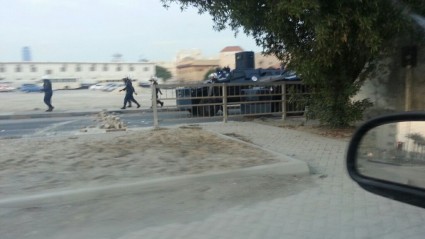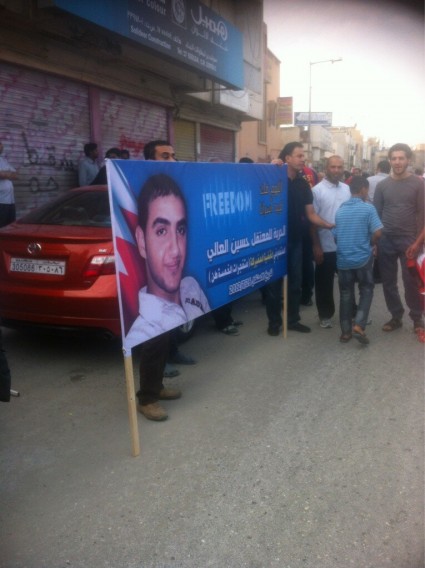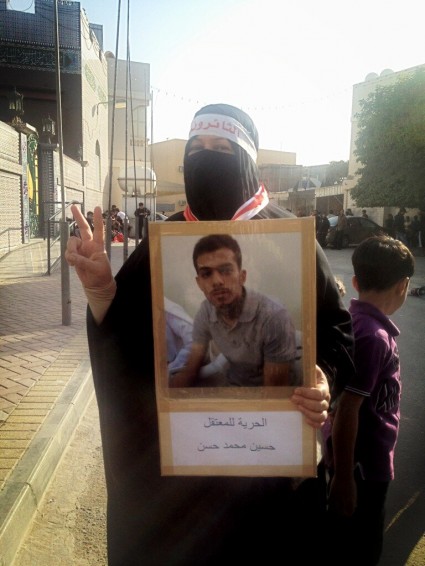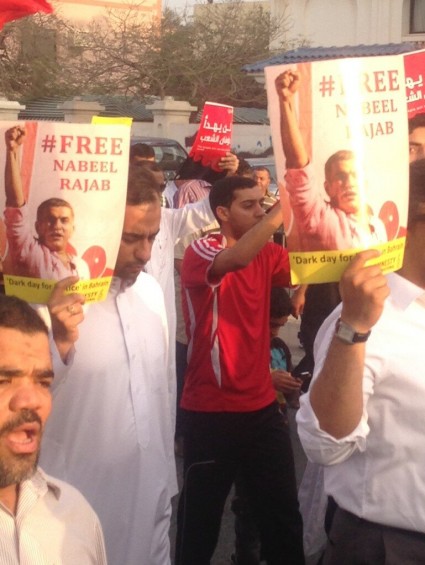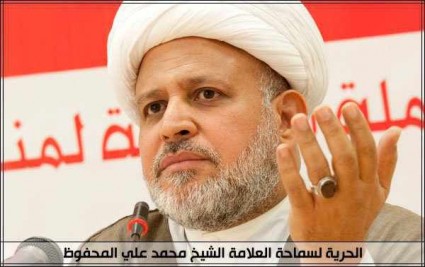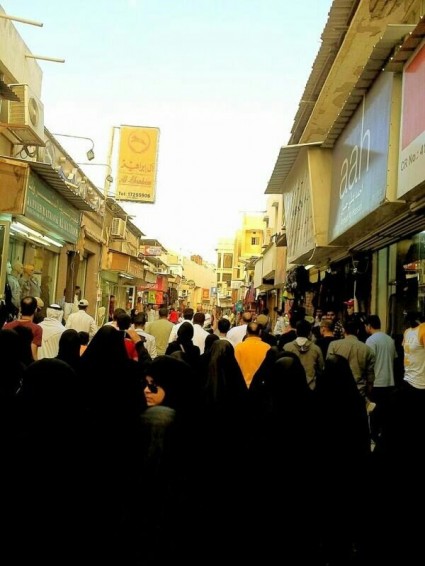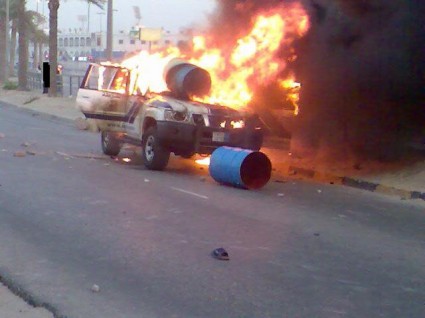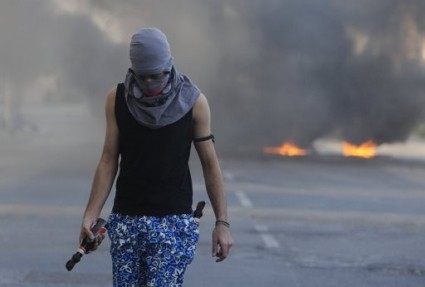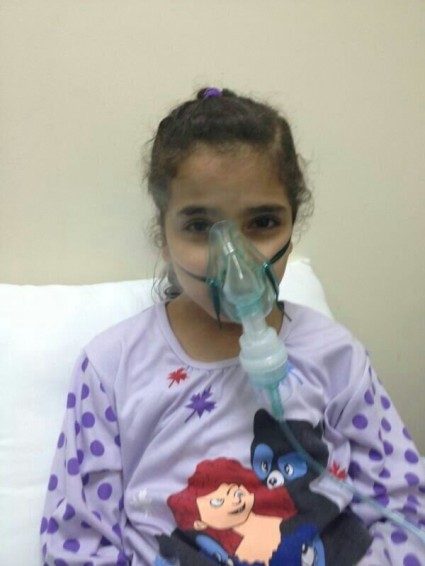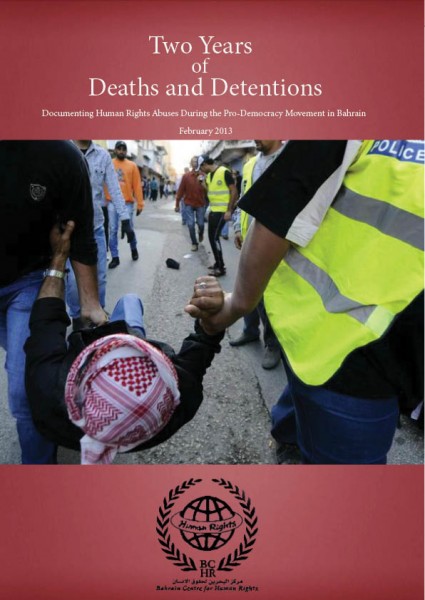Activist Maryam al-Khawaja Speaks-out about the recent history of Uprising in Bahrain
February 14, 2013 Add Comments
Day 35 of Hunger Strike as Politcal Prisoners Protest Torture, Abuse
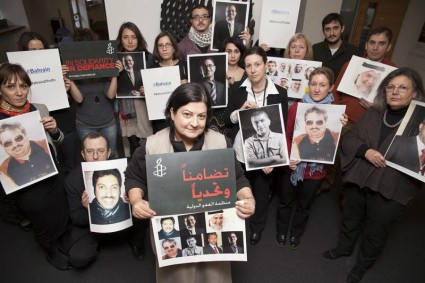 Ebrahim Sherif’s wife and others show solidarity with prisoners of conscience in Bahrain
Ebrahim Sherif’s wife and others show solidarity with prisoners of conscience in Bahrain
Bahraini prisoners on hunger strike in protest at mistreatment
13 February, 2013 – PressTV
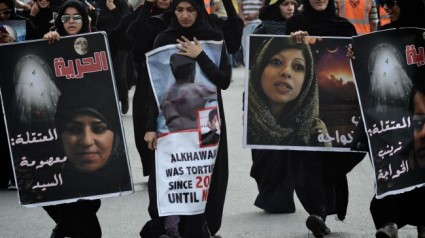
Bahraini women hold portraits of female prisoners during a rally in Janosan Village, in the western suburb of Manama, on May 18, 2012.
Several political prisoners have gone on a hunger strike in a prison in Bahrain in protest at the mistreatment of prisoners by prison officials, a report says.
The hunger-strikers took the initiative due to the violation of their basic rights and the dire condition of their living in the prison.
The Bahraini prisoners are deprived of their preliminary human rights, including visiting their families, which is the positive proof of illegal behavior of prison officials.
This came amid the continuation of anti-regime protests and the Bahraini people’s demands for the immediate release of political prisoners.
Bahrainis have been staging demonstrations since mid-February 2011, demanding political reform and a constitutional monarchy, a demand that later changed to an outright call for the ouster of the ruling Al Khalifa family following its crackdown on popular protests.
Dozens of people have lost their lives in the crackdown, and the security forces have arrested hundreds, including rights activists, doctors and nurses.
Bahraini demonstrators say they will continue holding anti-regime protests until their demand for the release of prisoners and the establishment of a democratically elected government is met. …source
February 14, 2013 Add Comments
Chemical Gas filled streets mark Anniversary of Uprising
Tear gas fills Bahraini capital as hundreds mark uprising anniversary
13 February, 2013 – RT
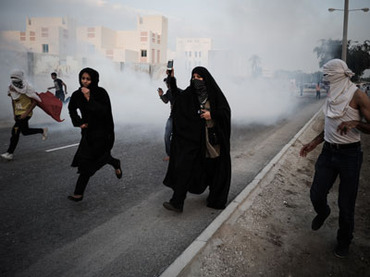
Bahraini protestors run for cover from tear gas fired by riot police following an anti-government rally to demand political reforms on February 12, 2013.(AFP Photo / Mohammed Al-Shaikh)
Bahraini protestors run for cover from tear gas fired by riot police following an anti-government rally to demand political reforms on February 12, 2013.(AFP Photo / Mohammed Al-Shaikh)
Bahraini police have used tear gas and stun grenades to disperse hundreds of protesters in Manama, as they marked the second anniversary of the Shiite-led uprising against the Sunni regime.
Demonstrators tried to march to Pearl Square, the site they occupied two years ago when the protest against the royal family – rulers for over 40 years – first began.
“Square of martyrdom, we all still have the will! Down with the corrupt government!” chanted protesters carrying Bahraini flags as reported by AFP.
“Khalifa resign,” the demonstrators also called, referring to the king’s uncle Prince Khalifa bin Salman, who has been prime minister for four decades.
The attempt to march to the square came after the main Shiite opposition bloc, al-Wefaq, organized a massive protest in which thousands took part in the Shiite village of Sanabis, near Manama.
After the opposition’s rally ended, “a group of saboteurs caused riots and blocked roads, requiring authorities to take legal action against them,” the interior ministry said on Twitter.
Opposition supporters have been demonstrating for more than a week ahead of the anniversary which is set for February 14. A Clandestine radical cyber-group Revolution Youth Coalition has reportedly called for demonstrations marking the date.
During the uprising in 2011, protesters camped for one month at Pearl Square before being forcefully driven out in mid-March. Authorities later razed the square.
Anti-government protesters have been holding demonstrations across Bahrain since that moment, calling for an end to the discrimination of the state’s Shiite majority by the predominant Sunni government.
Eighty people have been killed and thousands arrested since the unrest began. Many opposition figures have been arrested on the allegation of planning to topple the government.
The opposition believes that one of the reasons why Western powers support the “dictatorship” is the crucial US naval military base located in Bahrain. Meanwhile, Bahraini authorities claim the country has no problems with freedom of speech or democracy and denounce protesters as criminals and saboteurs trying to instigate revolution and topple the legitimate government. …source
February 14, 2013 Add Comments
US Supplied Black-Hawk helicopters conduct indiscriminate aerial bombings of Bahrain Villages on Anniversary of Uprising
February 14, 2013 Add Comments
Bahrain Regime engaged in systematic widespread use of CS Gas in lethal assaults against Children and Elderly
February 14, 2013 Add Comments
London Calls for Liberty for Bahrain
February 12, 2013 Add Comments
Government Organized Dialogue proceeds with a gun to the head and backdrop of brutality with impunity
Bahrain’s Dialogue Begins with “Positive Step”
11 February, 2013 – POMED
Bahrain held the first round of its national dialogue on Sunday with dozens of representatives from the main political groups participating. Bahrain’s six main opposition parties participated, as did loyalist parties such as the National Unity Gathering and the Salafi group al-Asala. The government itself only served as the organizer. The National Dialogue’s official spokesperson, Isa Abdulrahman, reported that the parties had agreed to meet twice a week and said that “the focus now rested on ‘building the bridges of trust between all parties.” Sheikh Khaled bin Ali al-Khalifa, Bahrain’s Justice Minister, called the meeting a positive start and said it “confirmed the importance of this dialogue.” The session lasted for more than three hours.
A negotiator from the opposition Democratic Progressive Tribune party, Abdulnabi Salman, said, “So far so good, and we will continue for the next session.” He said the government had not yet proven it was serious, but added, “They showed us that they can listen to us, which is a positive step.” The opposition parties said they would participate in the second session on Wednesday, but that they would discuss their plans on Monday. The dialogue participants agreed to limit the scope of the talks to resolving political differences. The dialogue’s schedule and agenda have yet to be decided.
Prior to the meeting, the opposition remained skeptical about the government’s commitment to reform. Early Saturday, Shi’a protesters lit tire barricades on fire as security forces fired tear gas at them. Police increased security around Pearl Square in Manama and Shi’a areas.
Meanwhile, the Bahrain Center for Human Rights published a report titled “Two Years of Death and Detentions.” It finds “no meaningful improvements made to the human rights situation” and “that on many levels the situation has become more serious.”
…source
February 12, 2013 Add Comments
Remembering Karim Fakhrawi as Dialogue with Killers goes ahead
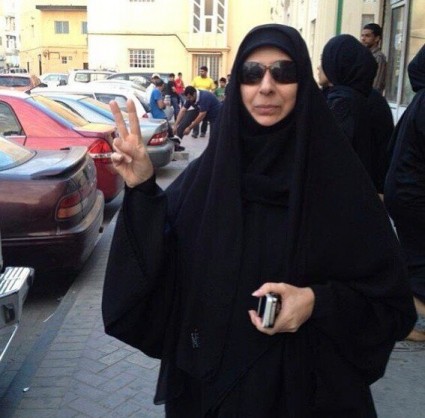
Wife of martyr Kareem Fakhrawi joined the protest in Manama earlier today, 12 February, 2013
Karim Fakhrawi
Al-Wasat -April 12, 2011, in Manama, Bahrain
Fakhrawi, founder and board member of Al-Wasat, the country’s premier independent daily, died in state custody a week after he was detained, according to news reports. Human rights defenders told CPJ that Fakhrawi had gone to a police station on April 5 to complain that authorities were about to bulldoze his house.
Bahrain’s official news agency said on Twitter that Fakhrawi died of kidney failure. Photographs published online, however, showed a body identified as that of Fakhrawi with extensive cuts and bruises.
The journalist’s arrest came amid sweeping civil unrest in Bahrain and a government crackdown on independent reporting. In early April, the government accused Al-Wasat of “deliberate news fabrication and falsification,” said it would file criminal charges against three of the paper’s senior editors, and deported two of its senior staffers.
Fakhrawi was one of numerous investors in Al-Wasat, local journalists told CPJ. He was also a book publisher, the owner of one of Bahrain’s biggest bookstores, and a member of Al-Wefaq, Bahrain’s chief opposition party.
Fakhrawi’s death was the second media fatality in Bahrain in less than a week, both occurring in government detention facilities. In the two decades prior to that, no journalists had died in relation to their work in Bahrain, CPJ research shows. …source
February 12, 2013 Add Comments
Talks with Al-Khalifa “Meaningless” under Saudi Occupation
Opposition Leader: Talks with Al-Khalifa “Meaningless” under Saudi Occupation
12 February, 2013 – FNA
TEHRAN (FNA)- A senior Bahraini opposition figure described the al-Khalifa regime’s proposal for talks with dissidents as a failed plan, and said talks under the Saudi occupation are meaningless.
“I don’t believe that there is no serious plan for (the national) talks, and that no comprehensive agreement is considered (by the Bahraini regime),” Saeed al-Shahabi, Secretary-General of Bahrain Freedom Movement, told FNA on Tuesday.
He said that the al-Khalifa has actually proposed the plan for talks to conceal the realities and the reality is that the Bahraini people have a big problem with the monarchy ruling their country.
Shahabi also called for the withdrawal of the Saudi forces who are collaborating with the al-Khalifa forces in suppressing the peaceful protests in Bahrain, and said any form of talks under the occupation of the Saudi forces would be impossible.
Anti-government protesters have been holding peaceful demonstrations across Bahrain since mid-February 2011, calling for an end to the al-Khalifa dynasty’s over-40-year rule, end of discrimination, establishment of justice and a democratically-elected government as well as freedom of detained protesters.
Violence against the defenseless people escalated after a Saudi-led conglomerate of police, security and military forces from the Persian Gulf Cooperation Council (PGCC) member states – Saudi Arabia, Kuwait, the United Arab Emirates, Oman and Qatar – were dispatched to the tiny Persian Gulf kingdom on March 13, 2011, to help Manama crack down on peaceful protestors.
So far, tens of people have been killed, hundreds have gone missing and thousands of others have been injured.
…source
February 12, 2013 Add Comments
Mass sit-in fills streets of Manama
Bahrainis stage mass sit-in in Manama
10 February, 2013 – Tehran Times
Protesters from across the tiny Persian Gulf island nation gathered near the capital’s Freedom Square on Saturday to call for freedom and democracy.
Bahraini activists have been staging demonstrations across the country over the past few days and plan to go on a general strike on February 14.
The Bahraini revolution began on February 14, 2011, when the people, inspired by the popular revolutions that toppled the dictators of Tunisia and Egypt, started holding massive demonstrations.
On March 14, 2011, troops from Saudi Arabia and the United Arab Emirates invaded the country, upon Manama’s request, to help the Bahraini regime quash the uprising.
The protesters initially said they wanted political reform and a constitutional monarchy. However, following the regime’s brutal crackdown on the popular protests, the Bahraini people began demanding that the ruling Al Khalifa family step down.
Scores of people have been killed and hundreds of others arrested in the crackdown, but the protesters are undaunted and have refused to back down on their demands.
A report published by the Bahrain Independent Commission of Inquiry in November 2011 found that the Al Khalifa regime had used excessive force in the crackdown and accused Manama of torturing political activists, politicians, and protesters.
Physicians for Human Rights says doctors and nurses have been detained, tortured, or disappeared because they have “evidence of atrocities committed by the authorities, security forces, and riot police” in the crackdown on anti-government protesters.
…source
February 12, 2013 Add Comments
The people of Bahrain will remain in streets until demands are met
Bahrain opposition: the people of Bahrain will remain in streets until demands are met
(Ahlul Bayt News Agency) – The Bahraini national opposition parties stressed that the political majority of the people will remain in streets and will not give up on its rightful demands for real democracy like the world nations, in which the final say is for the people. These demands have been repeatedly and very clearly announced and are understood by everyone.
In the final communiqué of yesterday’s mass protest march which took place in Sitra within the opposition’s 16 day program of demonstration and protests ahead of the 2nd anniversary of the peaceful pro-democracy revolution, the opposition parties stressed that any dialogue or political maneuvers or calls by the regime or anyone else, are no reasons for the Bahraini people to end protests in streets, the masses who took to streets in 14 February 2011 will not leave the streets until their demands, sooner or later.
The opposition affirmed that the people of Bahrain are well aware and will not be fooled, and their demands cannot be circumvented, the suppression can no longer silence the people nor end the movement for legitimate demands for freedom and democracy.
The opposition parties pointed out that the demands of the Bahraini people are no exception from all nations seeking democracy in this world. These democratic demands aim to build a real state and achieve permanent stability for Bahrain and make the people the source of all powers far from tribal and tyrannical rule.
The opposition stressed that carrying on with the suppressive security crackdown will only further complicate the situation in Bahrain, this policy does not reflect seriousness towards a solution, and the regime takes full responsibility of this.
10th Feb 2013
The opposition parties:
Al-Wefaq National Islamic Society
National Democratic Gathering Society
National Democratic Action Society
Unitary National Democratic Assemblage
Ekhaa National Society
February 12, 2013 Add Comments
Ali AlTaweel death sentence upheld by Bahrain Court of Injustice based on Coerced Confession
Bahrain: Court Upholds Death Sentence Based on Coerced Confessions
10 February, 2013 – Bahrain Center for Human Rights
The Bahrain Center for Human Rights expresses concern over the appeal court’s decision on 23 Jan 2013 to uphold the death sentence of Ali Yousef Abdul Wahab Al-Taweel (23 years old) who has been detained since April 2011, for the alleged crime of running over a policeman on 15 Mar 2011. The death sentence was initially ordered by a military court in Sep 2011.
Arrest, Detention and Torture
Ali AlTaweel was subjected to several human rights violations from the first moment of his arrest. On April 19th, 2011, he was staying at his sister’s house when it was attacked in an early morning raid. He was arrested by masked men in military and civilian clothing, and his hands were tied behind his back with a belt. When he asked why he is being arrested, the officer informed him that he would know after being beating and hung in the air. He was dragged and beaten in front of the neighbours. The officers covered his face with his clothes and hit him harshly and continuously during the ride in the car – he was struck repeatedly on his face, abdomen, back and pelvic area. In addition to the physical abuse, he was also verbally insulted.
At the first location where AlTaweel was detained, the Isa Town police station, Ali AlTaweel was reportedly subjected to torture for a continuous 13 hours where, during which time he was forced to confess to running over a policeman. AlTaweel came to know that he was selected for this accusation because another detainee gave his name saying that AlTaweel had a car with a smashed window. He was beaten with a hose on his feet, back and all over his body. He was deprived from sleeping, drinking water, eating food, going to toilet, and praying.
AlTaweel was then moved to the Criminal Investigation Department in Adliya where he was subjected to more torture. AlTaweel says that the official who gave the orders to torture him was Colonel Mubarak Bin Huwail – a person whose name was also mentioned by other torture victims, including tortured doctors. Bin Huwail is currently on trial for torturing medical professionals. See: www.muscatdaily.com/Archive/Opinion/We-were-blindfolded-handcuffed-and-tortured-Bahraini-medics
AlTaweel says that Bin Huwail tried to force him to confess to running over the policeman, and to say that he was incited by Shaikh Mohamed Habeeb AlMoqdad. He was beaten all over his body including on his genital area where he had a prior surgery. When he informed them of his previous surgery they increased beaten on that area. Under these conditions, AlTaweel gave many names as “inciters” including Ali AlShamlool who was later selected by the interrogators to be charged for inciting the crime. AlTaweel required a surgery for the damage he suffered due to beaten on his genital area. During his appeal trial in 2012 he attended the sessions in a wheel chair following this surgery.
AlTaweel was forced to sign confessions without being able to read them; AlTaweel stopped attending school in the 4th grade, and is therefore unable to read. He believes that his signature was forged on other statements by officers taking advantage of his illiteracy.
The military prosecutor never interrogated the two defendants. Their signatures were taken on pre-made statements.
AlTaweel was then taken to the military prison (AlQurain) where beatings and insults continued, especially when the guards knew about his accusation, he was beaten on his head and back, and the ill-treatment continued until mid-June when the Bahraini commission of Inquiry (BICI) visited the prison.
Military Trial
According to his lawyer, AlTaweel was not allowed access to a lawyer during the first three hearings at the military court. He was also not allowed any family visits before his third hearing session. On 29 Sep 2011, the military court issued its verdict against Ali AlTaweel, and sentenced him to death. The second defendant, Ali Atteyat Allah Mahdi Shamlool, was sentenced to life imprisonment. AlTaweel was accused with “running over police officer Ahmed Ahmed Al-Muraisi on 15 Mar 2011 in Sitra”, while AlShamlool was accused with instigating the crime.
Solitary Confinement
Since AlTaweel was moved to the Jaw prison after receiving the death sentence on 29 Sep 2011, he was placed in solitary confinement. He only leaves his cell during bi-weekly family visits. His lawyer fears that AlTaweel’s mental condition has been severely affected by the extended amount of time he has spent in solitary confinement, and believes that his sanity may be in danger. …more
February 12, 2013 Add Comments
Freedom Calling for 1000s of Bahrain’s Political Prisoners held to silence voices in every dialogue
February 12, 2013 Add Comments
Another Day working at the Revolution in Bahrain
February 11, 2013 Add Comments
No hope for real change in Bahrain with Al Khalifa at helm
No hope for real change in Bahrain with Al Khalifa at helm: Analyst
11 February, 2013 – Shia Post
A Bahraini opposition leader says that the developments in the past two years in the Persian Gulf island of Bahrain have proved that the ruling Al Khalifa regime cannot be trusted to bring about real changes.
The comments come as Bahraini protesters have held fresh protest rallies marking the second anniversary of their pro-democracy uprising against the ruling regime. Anti-regime demonstrators on Thursday held a massive march in the capital, Manama, while similar rallies were held in several other parts of the country. According to Physicians for Human Rights, many doctors and nurses have been detained, tortured, or have disappeared because they have “evidence of atrocities committed by the authorities, security forces, and riot police” in the crackdown on anti-government protesters.
Press TV has talked with Saeed Shahabi, Bahraini opposition leader from London to further discuss the issue at hand. What follows is an approximate transcription of the interview.
Press TV: Saeed Shahabi we are looking now this going into its second year, is there a chance for reforms to take place or has that threshold been passed at this point, based on what the Bahraini people want?
Shahabi: It is clear from the insistence of the people of Bahrain that they believe that reform was not possible with this regime because it has failed drastically in implementing any sort of reforms.
Two years now of revolution and it has not implemented one single act of real political reforms apart from some technical matters with regards to the politics of the country, how the country is run, what is the role of the people, where does the ruling family stand in the midst of all this.
It has really rejected and refused to look into these matters while the people want real reforms. So the reform is not forthcoming after decades of struggle and the only conclusion from all of this, is that this Al Khalifa dynasty cannot be trusted to rule the country and it is now time for a real change in the country and that Al Khalifa must go and leave the people to look after themselves.
Press TV: If you want to look at, perhaps like the opposition al-Wefaq, what types of activities should they be involved with, regarding pushing forward their agenda for change aside from the protests that we see happening?
Shahabi: I think that there are two blocs in the country.
First you have the revolutionary bloc which consists of the 14th of February Alliance and if course the other movements whose leaders are in jail like Hassan Mushaima, Abdulwahhab Hussain, Sheikh al-Meghdad, Dr. [Abdiljalil] Alsingace, Dr. abdulhadi al-Khawaja; all of these groups are united under the banner of The Alliance for the Republic and then on the other hand you have the political societies which consist of al-Wefaq and others.
Now the people, as you know, because the revolutionary groups are not authorized and they are pursued all the time by the regime, they have limited area for movement, while the political societies have larger areas for movement.
Now the expectation is that these political societies must improve their political performance and that is they should really make themselves clear in their position.
They must call for demonstrations, they must really take the situation further. They can mobilize people, there are many regional scholars who will stand with any move to improve the wellbeing of the people and to ensure that the revolution does not fade away.
I think these political societies need to improve their performance, call for more solidarity with the revolution and also be present in the next week or so on the streets.
They should challenge the regime drastically because without this challenge the regime may feel that it is safe and sound.
I think that you will fall but only if those societies really out their hands in the hands of the revolutionaries. …source
February 11, 2013 Add Comments
Bahrain, Kuwait step up brutal crackdowns of dissent while Western Partners step-up weapons sales to Gulf Monarchs
February 11, 2013 Add Comments
US State Department policy of isolation toward Bahrain Oppostion turns them to Russia for support
Silent crisis: Bahrain opposition seeks support, international attention in Russia
9 February, 2013 – Russia Times
While Western media are focusing intensely on the Syrian unrest, injustices and human rights violations committed in Bahrain have been left out of sight, its opposition claims.
“The media have been silent about the crisis in Bahrain. There is a political reason to it and is immoral and unprofessional. Those who make a fuss about the events in Syria and Libya have forgotten that the Bahraini people are suffering from political repressions,” Fazil Iskander Abbas, general secretary of National-Democratic movement, said at a press-conference in Moscow.
On Friday, Bahrain opposition leaders met with Russian Foreign Ministry officials in Moscow to seek support in their struggle against the ‘dictatorship’.
Bahrain has experienced a military intervention from Saudi Arabian forces, who were invited to suppress “of its own people and popular movements and peaceful rallies” who demand a real legislative power and a government elected by the people, Fazil Abbas said.
The ‘dictatorship’ is supported by the Arab League, who does not interfere in the situation in the country, and the US, which pursues its own economic and military interests, the opposition leader explained.
Bahrain hosts US crucial naval military base. The opposition believes this is one of the reasons Washington closes eyes to people’s demands for democracy.
“It’s the US administration who blocks the launch of international criminal proceedings over the Bahraini regime. They have used double standards – on the one hand, they demand regime change in Syria, and on the other they support a dictatorship regime in Bahrain,” said Abbas.
The delegation expressed hope that the Bahraini people would accept and welcome Russian support.
“We urge the Russian leadership to support a serious dialogue in Bahrain and, in case this dialogue doesn’t take place, we urge Russia to take up a tough stance in international organizations that would prevent the US from ignoring the Bahraini crisis on the international level,” Abbas said.
Meanwhile, Bahraini authorities claim the country has no problems with freedom of speech or democracy.
“There is a democratic regime with high level of freedoms established in Bahrain,” said Information Minister Samira Rajab Bahraini told RT.
The minister denounced the opposition visit to Moscow, saying that use of international forces to interfere with sovereign issues of the state is not civilized or politically healthy.
Recent months have seen massive anti-government protests in Bahrain where people demand greater democracy and calling for an end to the Al-Khalifa family’s nearly four-decade rule. They accuse the ruling Sunni family of a crackdown on the country`s Shiite majority.
Some of the peaceful rallies turned violent as police tried to disperse demonstrations using teargas and grenades. In January one protester died after inhaling poisonous teargas. …source
February 11, 2013 Add Comments
Bahrain Regime Mercenaries leave 8 year old Haifa Isa fighting for life in another Gas attack on Children
February 11, 2013 Add Comments
Bahrain Regime’s Military Agreements with West an Impediment to Progress on Democracy and Human Rights
Bahraini Activist Discloses Al-Khalifa Regime’s Military Agreements with West
30 January, 2013 – FARS
TEHRAN (FNA)- A Bahraini activist lashed out at the al-Khalifa regime for its crackdown on the people, and disclosed that the Bahraini rulers have secretly signed military and security agreements with the West, specially the US and the UK, over the suppression of those civilians who take part in the country’s peaceful demonstrations.
“In addition to their arms sales to the regime, both Britain and America help the al-Khalifa regime with the suppression of the people’s revolution through their recommendations,” a leader of Bahrain’s al-Ahrar Movement Jafar al-Hessabi told FNA on Wednesday.
He noted that after the outbreak of the revolution in Bahrain, several experts of the UK’s Scotland Yard have been in Manama to advise the al-Khalifa regime on how to crack down on the people.
“Bahrain has military agreements with Britain and this country exports weapons to Bahrain, and the Bahraini crown prince was recently in the UK to sign new agreements (with that country),” al-Hessabi said.
In Bahrain, protesters and police clash almost daily as Demonstrations are banned.
Anti-government protesters have been holding peaceful demonstrations across Bahrain since mid-February 2011, calling for an end to the al-Khalifa dynasty’s over-40-year rule, end of discrimination, establishment of justice and a democratically-elected government as well as freedom of detained protesters.
Violence against the defenseless people escalated after a Saudi-led conglomerate of police, security and military forces from the Persian Gulf Cooperation Council (PGCC) member states – Saudi Arabia, Kuwait, the United Arab Emirates, Oman and Qatar – were dispatched to the tiny Persian Gulf kingdom on March 13, 2011, to help Manama crack down on peaceful protestors.
So far, tens of people have been killed, hundreds have gone missing and thousands of others have been injured. …source
February 11, 2013 Add Comments
Two Years on, Democracy and Human Rights Remain Crushed Underfoot of Western Imperialism
February 11, 2013 Add Comments
Bahrain Political Prisoners on Day 30 of Hunger Strike Protesting Unjust Detention, Torture and Abusive Prison Conditions
Bahrain: Urgent Appeal: Al-Khawaja, Al-Mukhoder, and Al-Singace on Hunger Strike
7 February, 2013 – Bahrain Center for Human Rights
The Bahrain Center for Human Rights is gravely concerned for the health of three activists and political leaders, Abdulhadi Al-Khawaja, AbdulHadi Al-Mukhoder and AbdulJalil Al-Singace, who have all begun a hunger strike to protest the unlawful restrictions that the prison authorities have placed on the communications for the Bahrain13, and the lack of response to their complaints by the prison administration.
When speaking on the telephone, if any of these prisoners attempts to discuss their health, their treatment in prison, or politics, the phone line is immediately cut. Since the prisoners of conscience had their final appeal denied in January, the restrictions have become much worse.
In addition to the unlawful restrictions that the authorities have placed on family communications, Al-Mukhoder and Al-Singace have both been completely denied access to a lawyer since their final appeal was rejected by the Court of Cassation on January 7th, 2013; Al-Khawaja is still allowed contact with his lawyer as he has a separate ongoing trial. BCHR has documented similar treatment to other activists, most recently on Dec 2012 bahrainrights.hopto.org/en/node/5584.
More than 25 days ago the above mentioned activists and political leaders, as well as the rest of the group of the Bahrain13, who are held on the case of “attempt to overthrow the regime” (More details: bahrainrights.hopto.org/en/node/5272 ) have all sent a letter to the prison administration to express protest to the violations to their right to concurrent and private communication with their family and lawyers. The incident which triggered this protest was when Hassan Mushaima attempted to tell his family about his health situation and the phone line was cut. They have boycotted their right to regular calls with their families as a protest. However no reply has been received from the prison administration to their letter and no improvement was seen on conditions. Thus the three activists have decided to escalate their protest and start a hunger strike to demand their basic rights.
Al-Khawaja began his strike on the 2nd of February, Al-Mukhoder and Al-Singace on the 5th and 7th respectively. Alkhawaja has been previously through a 110 days hunger strike which started in Feb 2012.
Lawyer Mohamed AlJishi has reported that AbdulJalil Alsingace has been taken to clinic to be treated three times since the start of the hunger strike.
The BCHR is seriously concerned that the authorities attempt to block all information relating to the detainees’ health and treatment is an attempt to hide human rights abuses. However, the primary concern of the BCHR remains to be that these men are prisoners of conscience, imprisoned on charges related to freedom of expression, and must be released immediately.
The Bahrain Center for Human Rights call for immediate action on behalf of the Bahraini authorities and the international community to:
• release all political prisoners and prisoners of conscience from prison immediately.
• implement sweeping reforms through the prison system to improve transparency and improve general prison conditions, including the recommendations in the BICI report.
• abide by the BICI report’s recommendations to investigate torture allegations throughout the judicial system and prosecute those found to be responsible in a fair and transparent court of law.
February 11, 2013 Add Comments
Two Years of Deaths and Detentions – A Report from Bahrain Center for Human Rights
The Bahrain Center for Human Rights publishes a second anniversary report:
Two Years of Deaths and Detentions
Documenting Human Rights Violations During the Pro-Democracy Movement in Bahrain
FOR IMMEDIATE RELEASE
(Copenhagen) – The Bahrain Center for Human Rights (BCHR) publishes their Second Anniversary Report Two Years of Deaths and Detentions, Documenting Human Right Abuses During the Pro-Democracy Movement in Bahrain. It is a quarterly edition of the continuing documentation of human rights violations in Bahrain following the start of the pro-democracy movement on February 14th, 2011.
This report aims to document the nature of King Hamid bin Al-Khalifa’s reaction to the pro-democracy movement in Bahrain.
February 11, 2013 Add Comments
Seattle Mayor Orders Stop to Police Privacy Invading Drone Program
In a Major Privacy Victory, Seattle Mayor Orders Police to Dismantle Its Drone Program After Protests
by Trevor Timm – Common Dreams – 9 February, 2013
In an amazing victory for privacy advocates and drone activists, yesterday, Seattle’s mayor ordered the city’s police agency to cease trying use surveillance drones and dismantle its drone program. The police will return the two drones they previously purchased with a Department of Homeland Security grant to the manufacturer.
EFF has been warning of the privacy dangers surveillance drones pose to US citizens for more than a year now. In May of last year, we urged concerned citizens to take their complaints to their local governments, given Congress has been slow to act on any privacy legislation. The events of Seattle proves this strategy can work and should serve as a blueprint for local activism across the country.
Back in early 2012, the Seattle city council was told that the Seattle police agency had obtained an authorization to fly drones from the Federal Aviation Administration (FAA). But they did not find out from the police; they found out from a reporter who called after the council after he saw Seattle’s name on the list obtained by EFF as part of our lawsuit against the FAA.
City council was understandably not happy, and the police agency was forced to appear before the council and apologize. It then vowed to work with the ACLU of Washington and the FAA to develop guidelines to make sure drones wouldn’t violate Seattle citizens’ privacy. But as long as the guidelines weren’t passed in a binding city ordinance, there’d be no way to enforce them.
After a townhall meeting held by police, in which citizens showed up in droves and angrily denounced the city’s plans, some reporters insinuated that city counsel members’ jobs could be on the line if they did not pass strict drone legislation protecting its citizens privacy.
Documents obtained by MuckRock and EFF in October as part of our 2012 drone census showed that the Seattle police were trying to buy two more drones despite the controversy. But that ended yesterday as the Mayor put a stop to the program completely.
Critics of the privacy protests said the participants were exaggerating the capabilities of the Seattle drones, given they would only fly for less than an hour at a time and are much smaller than the Predator drones the military flies overseas and Department of Homeland Security flies at home.
But while Seattle’s potential drones may not have been able to stay in the air for long, similar drones have already been developed and advertised by drone manufacturers with the capability to stay in the air for hours or days at a time. In fact, Lockheed Martin has been bragging about a drone that weights 13.2 pounds (well within the FAA’s weight limits) that can be recharged by a laser on the ground and stay in the air indefinitely.
Since the Seattle protests have heated up, similar complaints have been heard at local city counsels and state legislatures across the country. At least thirteen states are now considering legislation to restrict drone use to protect privacy, and there are also members of Congress on both sides of the aisle pushing the same thing.
Here in the Bay Area, we’ve experienced a similar situation. The Alameda County Sheriff’s Office tried to sneak through drone funding without a public hearing and told the county board of supervisors it only wanted to use the drone for emergency purposes. Yet in internal documents obtained by EFF and MuckRock as part of our 2012 drone census, the Sheriff’s Office said it wanted to use the drone for “suspicious persons” and “large crowd control disturbances.”
When EFF and ACLU held a press conference pointing out this discrepancy, the county backtracked and is now attempting to write privacy guidelines that could potentially be turned into binding law. We will keep you updated on further developments.
But regardless, it’s important that privacy advocates take the lesson from Seattle and apply it all over the country. This is an important privacy victory, and like we said back in May, local governments will listen to our concerns, so let’s make our voice heard.
…source
February 10, 2013 Add Comments
Julian Assange on Obama’s Murderous Drone Program
Assange urges US to leak drone strike documents
9 February, 2013 – The New Zealand Herald
WikiLeaks founder Julian Assange has urged US officials to leak secret documents on drone strikes, saying that the broad discretion to kill citizens shows a “collapse” in the American system.
Assange, who has angered US officials by releasing thousands of secret memos, used a rare US television appearance to condemn President Barack Obama’s controversial green light to kill American citizens who conspire with al-Qaeda.
“I can’t see a greater collapse when the executive can kill its own citizens arbitrarily, at will, in secret, without any of the decision-making becoming public,” Assange told the HBO talk show Real Time with Bill Maher.
“That’s why we need organisations like WikiLeaks. I encourage anyone in the White House who has access to those rules and procedures, work them on over to us. We’ll keep you secret and reveal it to the public.”
Assange spoke to host Bill Maher, a supporter of WikiLeaks, by video link from Ecuador’s embassy in London, where he has been holed up since June to avoid extradition to Sweden. Britain has refused him safe passage to Ecuador.
Swedish authorities say they want to question Assange over allegations of sex crimes. The former computer hacker says he fears Sweden will extradite him to the United States over WikiLeaks’s massive release of sensitive documents.
Bradley Manning, a young army intelligence analyst in Iraq, was arrested in May 2010 over suspicions he handed diplomatic correspondence and other data to the website. He faces life in prison if convicted by a military tribunal.
NBC News published an unclassified document by the Justice Department this week indicating that senior al-Qaeda operators may be lawfully killed, even if they are US citizens and are not shown to be actively plotting an attack.
The Obama administration called strikes legal, ethical and “wise,” and vowed to provide lawmakers with access to secret documents that outline the legal justifications for drone strikes.
Human rights groups voiced outrage in September 2011 when a US drone strike in Yemen killed radical preacher Anwar al-Awlaki and Samir Khan, editor of an al-Qaeda magazine. Both were US citizens who had never been charged with a crime. …source
February 10, 2013 Add Comments
US drone assassination program poses real threat of dictatorship
The US drone assassination program and the threat of dictatorship
9 February, 2013 – WSWS
Thursday’s confirmation hearing for John Brennan, President Barack Obama’s nominee for director of the US Central Intelligence Agency, provided a revealing and grim spectacle of the disintegration of what remains of democratic rights in the United States.
Some press accounts of the hearing have referred to Brennan being “grilled” on the US drone assassination program. On the contrary, the proceedings resembled nothing so much as a well-fed cat being questioned by a panel of skittish mice.
Brennan came as the representative of those within the US military-intelligence apparatus entrusted with defending the ruling class by means of killings, detentions and torture. As Obama’s counterterrorism adviser and the architect and director of an assassination program run out of the White House, he has presided over an unprecedented expansion of executive power and assault on core constitutional rights.
One senator after another, Democrats no less than Republicans, fawned over Brennan, declaring their admiration and gratitude for the bloody work of the CIA and their eager anticipation of confirming him as CIA director and working closely with him in the near future. None of them directly challenged the assertion of the most sweeping of the extra-constitutional powers with which he is identified—the power of the president of the United States to unilaterally and secretly order the assassination of American citizens.
Among those who expressed certain qualms about this system of extra-judicial executions was Senator Angus King of Maine, who helpfully suggested that a star chamber-style secret court be set up to rubber stamp and sanctify the White House’s “kill lists.”
Senator Ron Wyden of Oregon—in the context of present day US politics the most “liberal” member of the Senate intelligence panel—merely pleaded with Brennan for more public information on the drone assassination program. “Americans have a right to know when their government thinks it’s allowed to kill them,” he declared.
Contained in this statement is the tacit recognition that the rights enumerated in the US Constitution, including the 5th Amendment’s guarantee that no one “shall be deprived of life … without due process,” have been turned into a dead letter. …more
February 10, 2013 Add Comments

